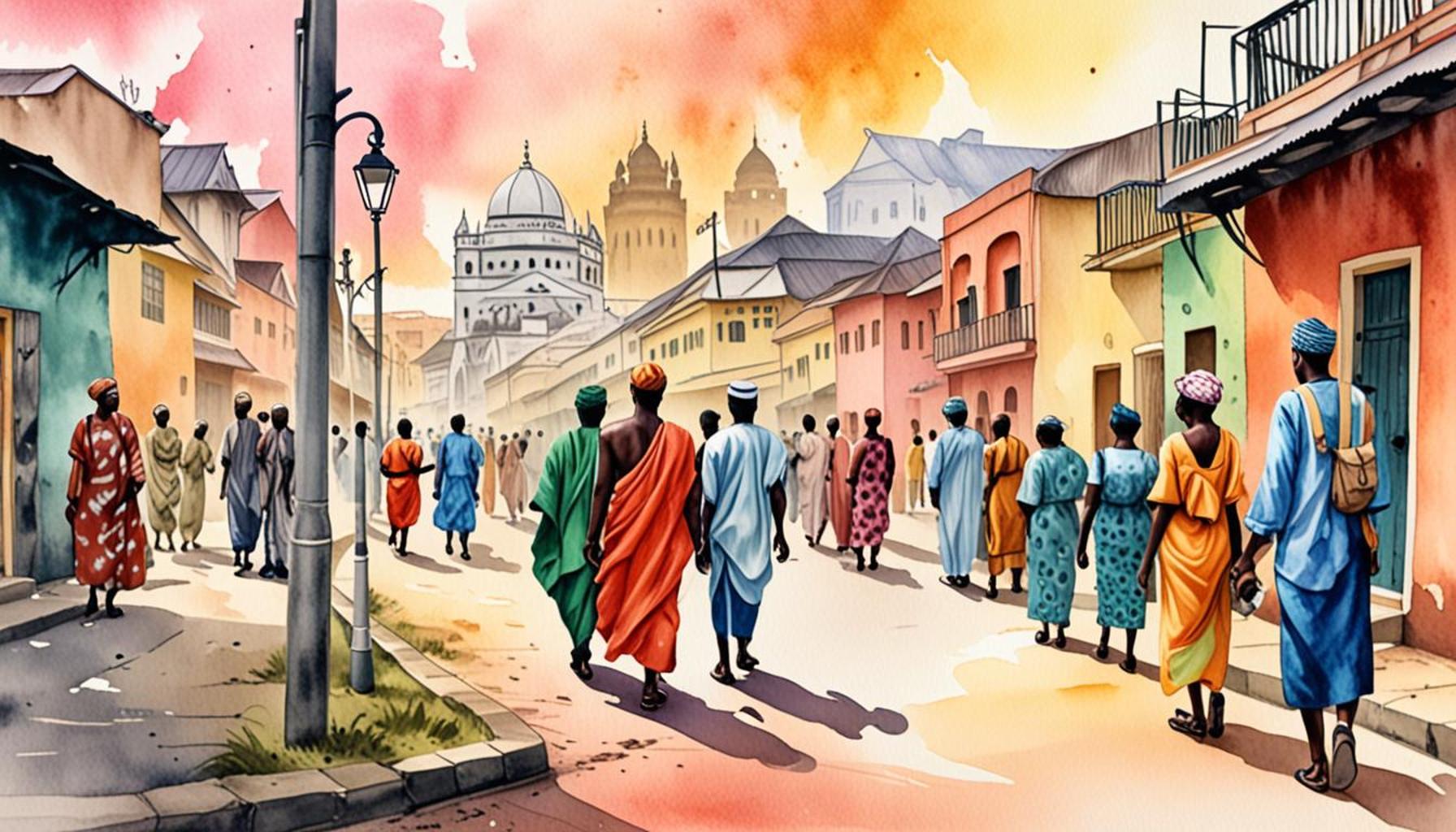Historical Walks: Exploring the Cultural Heritage of Nigerian Cities

Unearthing the Past on Foot
Nigeria is a country rich in cultural heritage, with its cities serving as vibrant storytellers of history. Walking through the urban landscapes of Nigeria provides a unique opportunity to experience its diverse traditions and historical landmarks. Each step taken on these historical walks unveils the intricate tapestry of cultures that make up the nation. From the bustling streets of Lagos to the serene paths of Enugu, each city has a distinct character defined by its history and people.
Why Explore Nigeria’s Historical Walks?
Walking tours offer intimate glimpses into the heart of Nigerian cities. Here are some reasons to join in:
- Local Insights: Engage with knowledgeable guides who share compelling stories behind each landmark. For instance, a walk through the ancient city of Kano allows visitors to hear tales of trade and commerce that shaped West Africa’s early economies.
- Architectural Marvels: Discover stunning examples of ancient and modern architecture, reflecting Nigeria’s evolution. In Kaduna, the intricate designs of the Juma’at Mosque stand as a testament to Islamic architectural influences, while the contemporary art installations in Abuja showcase the country’s modern artistic expressions.
- Cultural Experiences: Enjoy local cuisine, music, and art that enhance your understanding of the region’s heritage. In Port Harcourt, street food tours provide a taste of local delicacies like pepper soup and suya, all while immersing you in the vibrant sounds of local musicians playing afrobeats and highlife.
From the ancient walls of Daura that whisper tales of the Fulani heritage to the colorful streets of Ibadan, each city offers a unique narrative waiting to be uncovered. These historical walks are not merely strolls; they are a journey through time. In Ibadan, for example, visitors can explore the significant sites such as the Cocoa House, a symbol of Nigeria’s agricultural past, or the University of Ibadan, the first degree-awarding institution in Nigeria.
Join the Adventure
Whether you’re a resident or a visitor, exploring the cultural heritage of Nigerian cities through historical walks invites deeper appreciation for the nation’s identity. It’s a chance to walk the paths taken by great leaders and ordinary citizens alike. Imagine standing where the first Nigerian flag was raised during independence, or tracing the footsteps of the poets and writers of the Nigerian literary renaissance in the streets of Lagos.
Embark on this journey of discovery and witness the stories that continue to shape Nigeria today. The sights, sounds, and flavors of each historical walk create a mosaic of experiences that bind the past with the present, illuminating the spirit of a nation that continues to evolve yet maintains its rich cultural roots.

SEE ALSO: Click here to read another article
Delving into Nigeria’s Historic Gems
As you traverse the streets of Nigeria, you will discover that each city is a repository of legends, struggles, and triumphs. Cities like Lagos, Kano, and Calabar are not just places on the map; they are living museums that house stories of resilience and innovation. Engaging in historical walks allows participants to examine the fabric of society through architecture, oral histories, and cultural rituals, which are essential to understanding Nigeria’s identity.
The experience of walking through the city facilitates a deeper connection to the heritage that has defined the Nigerian landscape for centuries. In Benin City, for instance, you can visit the historic Benin Moat, one of the oldest man-made earthworks in the world, and learn about the Edo Kingdom’s significance in ancient trade routes. The Oba’s Palace, vibrant markets, and traditional craft shops provide a tangible link to the past and fuel curiosity for further exploration.
What to Expect on Your Walks
Each historical walk is an adventure that promises unique experiences. The following aspects make these walks particularly compelling:
- Heritage Sites: Visitors will encounter UNESCO World Heritage Sites like the Old Oyo National Park, where the remnants of the ancient Oyo Empire stand proud, reminding participants of Nigeria’s rich political history.
- Interactive Storytelling: Engaging with local guides skilled in narrating the oral histories tied to landmarks adds depth to every visit. Stories of the infamous Juju Shrine in Abeokuta shed light on spiritual practices and the local customs that remain vibrant today.
- Art and Craftsmanship: Admiring locally crafted works of art while walking through neighborhoods such as Ikorodu provides a glimpse into the contemporary fusion of tradition and modernity. The vibrant murals and sculptures sprinkled throughout cities showcase Nigeria’s emerging and established artists.
Another striking example is in Port Harcourt, known for its bustling markets and art scene. Historical walks in this city may include visits to the Klika Art Gallery and local craft markets, where artisans display traditional artifacts alongside contemporary works that reflect the community’s heritage.
These historical walks offer exhilarating insights into the complexities of life in Nigeria, unraveling tales of the resilient people who have shaped its culture. Each city’s unique history is an invitation to delve deeper into understanding what makes Nigeria a crossroads of diverse cultures. Prepare to be moved, enlightened, and connected to the heart and soul of Nigeria as you embark on these enriching journeys.
| Advantage | Description |
|---|---|
| Cultural Immersion | Participating in historical walks allows individuals to deeply engage with Nigeria’s rich history and cultural practices, enhancing their understanding of local traditions. |
| Educational Insights | These walks provide valuable knowledge about the architectural heritage, monuments, and significant events that shaped Nigerian cities, sparking further interest in historical exploration. |
As visitors navigate through the vibrant streets of Nigerian cities, they discover historical landmarks that tell stories of resilience, culture, and heritage. Each corner presents an opportunity to uncover the threads of the past, weaving together tales of ancient kingdoms, colonial influences, and post-independence progress. Through guided walks, participants not only witness the beauty of old structures but also gain insights into the socio-political contexts that shaped them.Consider the charm of cities like Lagos and Abuja, where modernity meets tradition. Walking through these urban landscapes, individuals can appreciate the diverse architecture that encapsulates Nigeria’s journey through time. From the colorful murals in historic districts to the ornate facades of colonial-era buildings, each step taken unveils layers of history waiting to be explored.As you venture into this captivating journey, allow yourself to be enveloped by the vibrant culture, engage in meaningful conversations with local historians, and witness firsthand the evolution of Nigeria’s cities. This immersive experience is not just about sightseeing but about embracing a rich legacy that continues to thrive amidst contemporary influences.
YOU MAY ALSO LIKE: Read read another article
Unearthing Stories Through Architecture and People
Exploring Nigerian cities through historical walks is fundamentally an exercise in storytelling. The architecture that lines the streets not only narrates the evolution of design and functionality but also speaks volumes about the people who built and occupied these spaces. For example, a stroll down the Railway Avenue in Lagos takes you past colonial buildings that housed British merchants during the colonial era, juxtaposed with vibrant street art symbolizing the fusion of cultures that define modern Nigeria.
Explorers will often encounter not just landmarks but also the layers of history embedded within the local communities. In Abuja, the capital city, a guided walk through the Arts and Culture Village reveals more than visual attractions. Here, historical dialogues with artisans who have dedicated their lives to preserving traditional crafts enhance one’s understanding of how cultural practices are both ancient and evolving. The intricate beadwork and weaving exhibited here showcase a rich heritage that thrives despite modernization.
Culinary Heritage: Tasting Nigeria’s History
No exploration of Nigeria’s cultural heritage would be complete without engaging with its diverse culinary landscape. Many historical walks integrate traditional food experiences, allowing participants to savor native dishes that tell stories of migration, trade, and habitation. For instance, in Calabar, known for being a culinary hub, try local delicacies like efik pepper soup or ofada rice at street-side stalls where recipes have been passed down through generations. Such moments not only tantalize the palate but also provide insights into the intersection of culture and cuisine over centuries.
- Food Markets: Markets like the Gbagi Market in Ibadan not only function as commercial centers but are also steeped in cultural significance. Interacting with sellers and learning about the origins of their products adds layers to the everyday experience of sourcing traditional ingredients.
- Culinary Workshops: Participating in food workshops led by local chefs allows you to engage with traditional cooking techniques, representing a hands-on approach to understanding Nigeria’s cultural heritage.
The tales told by the food also echo the history of the people who have cultivated these flavors, showcasing how shared meals foster community ties and unite diverse ethnic backgrounds. The importance of food in bonding extends beyond simple nourishment, serving as a platform for storytelling in every Nigerian household.
Living Heritage: Festivals and Cultural Events
Integrating local festivals into historical walks further enriches the experience. In cities like Oyo, the annual Oyo Festival celebrates culture through traditional music, dance, and theatre, inviting both locals and tourists to witness the vibrancy of Yoruba traditions. Walking through the festivities, one witnesses a powerful display of ritualistic practices and communal joy, showcasing how history is alive and continues to evolve.
Additionally, the Durbar Festival</strong in Kano offers an immersive experience as horsemen clad in traditional attire parade through the city, linking the past to the present. Such events are crucial for understanding cultural narratives while engaging with local communities, highlighting the enduring significance of heritage in Nigeria’s sociocultural fabric.
Through these multifaceted experiences – from architecture to culinary delights and dynamic festivals – those embarking on historical walks can truly appreciate the depth and diversity of Nigeria’s cultural heritage. With every story whispered by the streets and traditions shared, participants gain insights into the richness of a nation defined by its resilient spirit and vibrant culture.
SEE ALSO: Click here to read another article
Conclusion: Embracing Nigeria’s Rich Cultural Tapestry
In summary, historical walks through Nigeria’s vibrant cities offer a unique lens for appreciating the country’s rich cultural heritage. As we wander through bustling markets, colonial architectures, and vibrant festivals, we uncover layered narratives that speak to generations past and the resilience of communities present. Each city presents its own distinct story—whether it’s the aroma of local dishes in Calabar, the intricate crafts in Abuja, or the lively celebrations at the Oyo Festival. These elements not only enrich our understanding of Nigeria’s diverse cultural landscape but also foster a sense of connection among its people.
The importance of engaging with local artisans, chefs, and storytellers cannot be overstated. It is through these interactions that we glean insights into traditions that have survived the test of time and modernization. Furthermore, the vibrant flavors and customs found in Nigeria’s culinary heritage serve as a delicious reminder of the country’s history and shared experiences.
For anyone looking to appreciate the depth of Nigeria’s identity, historical walks are an invitation to explore, engage, and reflect on the cultural tapestries that define these cities. By immersing ourselves in the unique stories of architecture, cuisine, and community events, we not only celebrate our past but also contribute to the continuing evolution of our national heritage. As we advocate for the preservation of these experiences, we pave the way for future generations to explore and cherish the rich narratives that bind us together.


